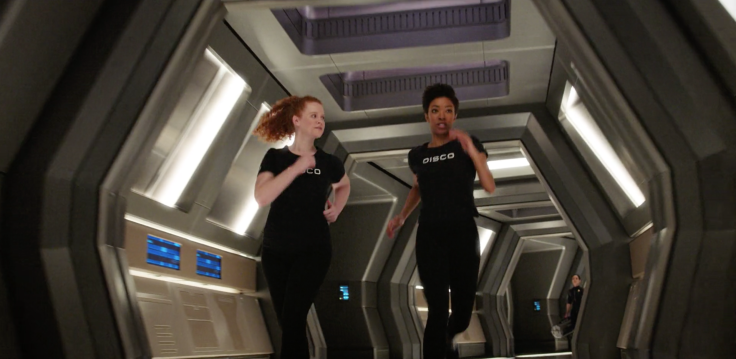Unlike onboard The Next Generation’s Enterprise, where crewmembers never deign to run, even in the most dire emergency, the corridors of Discovery are filled with joggers night and day.
Yes, I want to ride in your big spaceships. Yes, I want to explore strange new worlds. Yes, I want to make first contact. Yes, I want to live a life defined by bettering myself and the species rather than chasing paychecks.
But no, I don’t want to jog.
Jogging has already come up a couple times in Star Trek: Discovery, and we’re not even halfway through the first season. At first it looked like something Michael Burnham did to fill the time and cope with her outsider status on the Discovery. As a famous mutineer and Federation prisoner, released only temporarily to serve the war effort, jogging seemed like an adequate replacement for a social life. You know, if you’re into that kind of thing.
But then came the series’ sixth episode, “Lethe,” which finds Burnham joined in her morning jog by her mentee, Cadet Tilly, who is determined to one day become a Starfleet captain. According to Burnham, the path to a captain’s chair begins with a fitness commendation.
That makes a certain amount of sense. Fitness would be an important asset for any member of Starfleet — you never know when you’ll need to run from a salt vampire, gorn, or mugato.
But the appeal of Star Trek isn’t really about Starfleet as an organization. While part of us knows that the crewmembers that serve on starship bridges are remarkable people, even in a remarkable age, a bigger part of the appeal depends upon imagining Starfleet as society. It’s a better future, where all of us are remarkable and going on wild adventures.
So any reminder that, no, this too is reserved for those Type-A genetic lottery winners who carefully manage their careers and tailor their resumes — the kind of people who really like “lifehacks” — is a bit depressing. It may be realistic, but there’s nothing fun about imagining the future cubicle awaiting the mediocre, asocial and maladapted chuds, like me, while the cool kids wake up early to go jogging, eat chia seeds and romp around the galaxy tripping out on space mushrooms and sleeping with hot aliens.
What sucks even more is just how little the self-motivated, productivity mindset seems to have changed in the 239 years between now and the Star Trek: Discovery era. “Two more laps before breakfast,” Burnham says to Tilly, pushing her that extra bit. “See your path, stay on it, reach your destination: cadet to captain, just like that. What’s it going to be, Tilly?”
So we’re still operating on the same “brass it out” willpower-is-everything schema? Booooooooooooooooooooooooo. Isn’t there just some jogging pill I can take?
While the Star Trek utopia has never been exactly coherent, the gist is that the inhabitants of a post-scarcity society wouldn’t need to fight for resources and could instead spend their time bettering themselves and others. But that’s not really how people work: the hedonic treadmill never allows us to reach a “post-scarcity” mentality. For example, access to food is post-scarcity for huge swathes of humanity (though not as broad a swathe as many think), but the result has hardly been utopian. Instead, people chase increasingly more obscure, silly and expensive pleasures, like covering their ice cream in gold or drinking coffee that was first shat out by some sort of cat-rat. Can anybody reasonably say that the rich are better people for having everything they want?
But it goes beyond that. Star Trek also assumes that humanity has made a species-wide moral improvement. We simply aren’t the people we once were (there’s even a TNG episode about how shitty 80s/90s humans act). You would think such a fundamental transformation would have elevated us beyond willpower platitudes and the push-yourself attitude typical to our current struggles with bodily fitness (which, btw, isn’t working too well, if you hadn’t noticed). But no, Star Trek: Discovery can’t imagine humans beyond that current paradigm.
This is best demonstrated right after they finish their jog and Tilly tries to order a green juice at breakfast, only to have Burnham put her on a diet. “Computer, cancel that order,” she says. “That’s hardly the correct ratio of protein, carbohydrates and fat. Computer, three egg-white breakfast burrito with black beans.”
Was I the only one that just figured replicators handled the nutritional stuff all on its own? Isn’t that why Deanna Troi could slam so many hot fudge sundaes in Ten Forward? You’re telling me I have to calorie count in space too?
No, I don’t want to jog. More than that, I don’t want a future where there’s still pressure to jog. I’d rather a future where lifestyle gurus and self-improvement lifehackers are shot out the nearest airlock. Productivity is a metric for robots mining resources, not thinking things. And while we’re at it, theoretical utopian future, keep that egg-white breakfast burrito out of my face.
The future is ruined now. Star Trek seemed like such a good idea until they took the yolks away.
- Richly redesigned Klingons
- Complex and explicable motives
- Great new Starfleet characters
- Incredible production design
- Generic space combat and action
- Too many flashbacks
- Eschews subtext, doesn't put enough faith in the audience



















